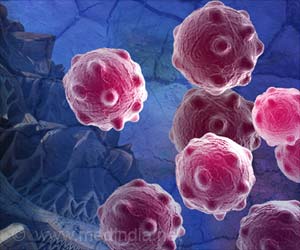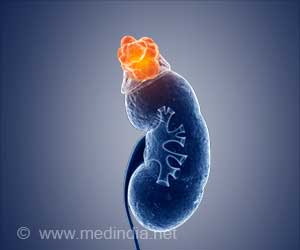Genetic discovery links mitochondrial mutation to resistance in metastatic melanoma immunotherapy treatment.

Inherited mitochondrial genetics as a predictor of immune checkpoint inhibition efficacy in melanoma
Go to source).
TOP INSIGHT
Did You Know?
Nearly 50% of metastatic melanoma patients do not respond to immunotherapy-and a specific mitochondrial mutation passed down from mothers, may be the key reason. #medindia #mitochondrialdna #melanoma
Genetic Mutation Linked to Treatment Resistance
While the drugs have proven highly successful in treating metastatic melanoma and several other cancers, the therapies are known to not work for almost half of those who are prescribed them, usually after initial chemotherapy or surgery have failed to stem the growth of new cancer cells.Led by researchers at NYU Langone Health and its Perlmutter Cancer Center, the new study involved a genetic analysis of blood samples from the ongoing landmark CheckMate-067 Phase 3 trial being conducted in over 100 medical centers in 19 countries. Study results showed that patients with a specific type of genetic mutation, called MT haplogroup T (HG-T), were 3.46 times less likely to respond to checkpoint therapy than those without HG-T.
Mitochondrial DNA and Immune Cell Link
Mutations are changes encoded in the DNA of abnormal or different cells. Researchers found the HG-T changes in immunotherapy-resistant patients’ cell powerhouse structures, or mitochondria. Mitochondrial DNA is unique in that it is passed down only from a mother to her offspring, with no genetic contribution or copy from the father, as is traditionally found in a cell’s control center, or nuclear DNA. Over time, mitochondrial DNA has evolved worldwide into subgroups labeled from A to Z based on their common mutations.Published in the journal Nature Medicine online June 5, the researchers say they decided to focus on mitochondrial DNA not just because of its unique lineage but also due to previous research showing it played a role in immune cell development.
Checkpoint Drugs and Immune Response
In the CheckMate trial, immunotherapy drugs, such as nivolumab, were used alone or in combination with another checkpoint inhibitor, ipilimumab, in preventing postsurgical recurrence of melanoma. The drugs work by blocking molecules (the checkpoints) that sit on the surface of immune T cells to keep them from attacking cancer cells like they would invading viruses or bacteria. The body normally uses checkpoints to recognize healthy cells, but in cancer, tumor cells have hijacked and turned off the checkpoints to evade immune system detection. Immunotherapies block checkpoints, making cancer cells more “visible” and vulnerable again to immune cells.To validate their CheckMate findings, researchers then checked their initial results against samples from 397 metastatic melanoma patients of similar age and gender, whose immunotherapy treatment records were stored at NYU Langone as part of the International Germline Immuno-Oncology Melanoma Consortium (IO-GEM). Results again revealed the same link of immunotherapy resistance to HG-T.
Biomarker Discovery and Future Implications
“Checkpoint immunotherapy has become the mainstay in cancer care in the past decade, especially for those with metastatic melanoma, but until now it has never been clearly explained why nearly half will not respond to treatment,” said study co-lead investigator and epidemiologist Kelsey Monson, Ph.D.“Our study results offer the first scientific evidence of a genetic biomarker, or presence of a mitochondrial mutation known as MT haplogroup T, to help explain why and identify those metastatic melanoma patients who are most likely to not respond to immunotherapy for the disease,” said study co-lead investigator and molecular biologist Robert Ferguson, Ph.D.
Potential for Patient Screening and New Trials
“Our findings make possible future testing for the presence of MT haplogroup T to determine which metastatic melanoma patients are most likely to not respond to checkpoint therapy, so other treatment options can be considered, which in turn could improve overall outcomes,” said senior study investigator Tomas Kirchhoff, Ph.D.“These study results also raise the possibility that other mitochondrial haploid variants could influence which patients respond to other immune therapies,” said Kirchhoff, an associate professor in the Department of Population Health at NYU Grossman School of Medicine and a member of the Perlmutter Cancer Center.
Reference:
- Inherited mitochondrial genetics as a predictor of immune checkpoint inhibition efficacy in melanoma - (https://www.nature.com/articles/s41591-025-03699-3)
Source-Eurekalert
 MEDINDIA
MEDINDIA




 Email
Email






